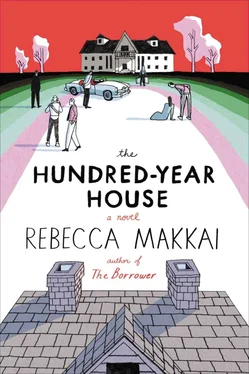She sat at the breakfast table with a book. George wasn’t there yet. He’d begun sleeping in the small bedroom with the four-poster on nights when he returned home closer to dawn than sunset. He was either up there asleep or he wasn’t, but wondering wouldn’t accomplish much. She asked for eggs and toast, no meat, and opened her book to the middle. A romance. A college friend had sent six of them as a joke wedding gift — the whole Ancient Passions set, tied with pink ribbon, a calligraphed note: For when that flame flickers! — and Grace had ripped through two just since Paris. This one was set in an English manor house in the reign of Henry VIII. The poor servant girl and the second son were madly in love with little hope of marriage. She’d have imagined it finished badly for all, were this not the type of book that guaranteed a happy ending. How funny it would have been, what a great trick on the poor lonelyheart readers, if one of these stories ended terribly. Abandonment, shame, an accidental baby with six fingers on each hand. The heroine taking to the streets.
George arrived, unshaven. His hair a mat of black curls, his eyebrows mirrored by the dark circles beneath. He was even more beautiful like this than neatly groomed. She closed the book, but didn’t bother hiding it under her napkin. He snorted at the cover and asked where the cook was. Grace forked some eggs onto her saucer and slid it across the table to him, and she poured half her coffee into his cup.
She said, “Do you know anything about Max’s new guest, in the coach house?” She’d been going to ask him last night at dinner, but he’d taken a phone call and she ended up eating alone. “A woman.”
He scratched behind his ears. “It’s your house, Duck. Tell me what you want. You want me to bark at him?”
She considered. “No. I can handle it, certainly. I just wondered if he’d cleared it with you.”
George laughed and tried to catch the cook’s attention through the open kitchen door. “I think the fellow’s smart enough to know I’m not the one to clear it.”
“Well. In any case, there’s a guest. A distinguished sort of witch, all dressed in black. Just so long as you don’t go mangling her bosom.”
George lifted a thick eyebrow, but the look on his face was all amusement. No denial, and certainly no apology. If he’d already been drunk for the day, he might have thrown his coffee cup at her face. As it was, he seemed on the verge of saying something slick and snide, but just then Rosamund, strapping, gray-eyed Rosamund, strode through the door with the coffee and a heaping plate of eggs.
Grace said, “I’ll manage it all.” Though she had no idea how to speak to Max, no desire to put her authority to the test.
George paused his bite in front of his mouth and said, “Your dear departed grandmother is staring me down. Can’t we move her?”
She glanced over her shoulder at the portrait. “She’s beautiful, I think.”
“She makes my skin crawl.”
“We can change seats.”
“I’d rather have a ghost look me in the eye than look down the back of my neck.”
“We can’t take it down. Father would be mortified.”
“You think he’s going to see? You think he’s going to visit us? Grace. They’re never going to visit. Don’t you understand that yet?”
—
Back in the attic, she considered how to spend her day. Her favorite corner, the northwest one, was a most comfortable nest. She had covered an old, splitting Morris chair with a green blanket, and pushed it over to the file cabinets that formed a little cove by the dormer. She’d found a half-finished painting on a piece of rolled linen, and she’d carefully unrolled it and cleaned it of dust, and tacked it to the wall below the window. It was maybe meant to be an oak leaf, in intense close-up. She put a board across the arms of the Morris chair, and this became her desk for drawing and writing letters. It was exactly like an artist’s garret in Paris in the nineties, she decided, somewhere on Île Saint-Louis, and when Amy crunched by on the path Grace pretended it was a fishmonger.
Today she would plan her greenhouse. Ludo was thrilled at the idea, and he’d promised to learn orchids. She sketched it out on the back of an empty folder from the cabinets — not the architecture of it, which was already determined, but the placement of the plants — and she used a second folder as a ruler. She penciled in the neat little shelves and pots. Here, along the eastern windows, tomatoes and lettuces. How heavenly, in January, to eat a soft, ripe tomato. There should be spinach, as well. She thought of a hot vegetable pie. African violets along the inner wall by the house, unless there wasn’t shade enough. Phalaenopsis along the west, framing the view of the back lawn: white, purple, pink. Yellow lady’s slipper, the small ones. Ferns all over the middle, a jungle of ferns, and a little copper mister. Ferns hanging from the ceiling, as well, and other things that would lilt down with soft tendrils and green threads of hair.
In another life, she’d have been a botanist, or a painter of plants. In college she took a whole course on the plant kingdom. The professor, an ancient British woman, had cut an apple in half the wrong way — down its equator — and turned the halves out to face the girls, to show them the stars that had been hiding there, the carpels, the seeds cut through and leaking arsenic. Stars! In the apples she’d been eating for twenty years! Suddenly, that year, every tree had a name. When boys sent her flowers, she’d sit at her dormitory desk dissecting each one, pulling daisies apart into disc flowers and ray flowers, splitting the bases of lilies with her thumbnail to find the rows of neat, white ovules.
And what was she to do with all that information now? The French literature, too, and the appreciation for Dutch art, and the ability to write a theme on Chaucer. What were those skills but silent companions in the attic, ways to keep her mind from digesting itself over the next fifty years? She imagined her classmates amusing their husbands with their intelligence. When she’d tried talking to George in Paris about the architecture of the bridges on the Seine, he’d accused her of humiliating him.
Her boredom wasn’t his fault. What had she done with herself from college to the age of twenty-eight? Precisely nothing. She’d traveled to Italy with her mother (educational, but none of the Italian stuck), she’d answered telephones in her father’s office, she’d been engaged, or pretended to be, to two boys, which took a great deal of time and energy but little creativity. She’d been sick for an entire winter with pneumonia. She’d organized blood drives for the Canadian Red Cross. Never, in that time, had she impressed anyone with her knowledge of Chaucer.
Here came Amy, crossing the drive, arms empty for once. She walked with her nose down, as if someone had forbidden her from seeing anything beautiful in the world. Grace was not ready yet to confront Max, but she could talk to Amy. She could get her bearings.
By the time Grace got downstairs, Amy had disappeared. She looked for her in the kitchen (no Amy, but Rosamund had a question about what vegetables Mr. Grant would accept in his stew) and down by the linen closets. She finally looked out the dining room windows and spotted her standing under the catalpa tree, the same one where George had manhandled her. But she was facing the tree, staring at its bark, and George was nowhere around. So Grace walked outside despite the cold, and came up slowly beside her.
“It’s a northern catalpa,” she said, and Amy jumped and gave a rough little shriek.
“Mrs. Grant,” she said. “I’m sorry. I thought — maybe you were an animal or something.”
Читать дальше












